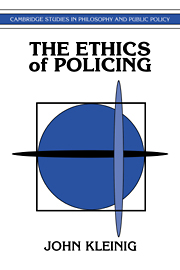1 - Introduction: ethics and police ethics
Published online by Cambridge University Press: 05 June 2012
Summary
READERS' GUIDE
In preparing this volume, it has been my intention to address the interests of several kinds of readers. The lack of a reasonably comprehensive and scholarly discussion of police ethics is responsible for the formal structure that I have adopted – one that begins with wider and more abstract questions of moral theory and political philosophy before engaging with the more explicit concerns of operational police officers – and it is probably only those with a theoretical interest in police ethics who will feel tempted to read the book straight through. Most others, I suspect, will have a more limited interest in some of the specific challenges that confront operational officers and detectives in their day-to-day activities. Nevertheless, because some of the theoretical background bears importantly on the subsequent argument, it should not be ignored altogether.
For the reader who is interested only or primarily in the “hard moral questions” that confront police officers, I suggest that a beginning be made with Chapter 2, Section 2.4, in which I argue that the police role is most satisfactorily construed as a form of social peacekeeping. In fulfilling that role, police will often find themselves caught between the real and ideal, between competing factions and groups, between the public they serve and the culture of their own organization. Does this role, with its peculiar challenges, give police certain moral prerogatives that “common morality” would eschew?
- Type
- Chapter
- Information
- The Ethics of Policing , pp. 1 - 8Publisher: Cambridge University PressPrint publication year: 1996

